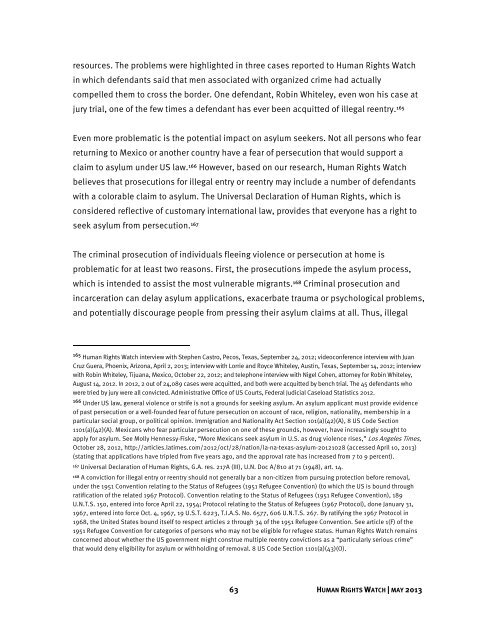Download the full report - Human Rights Watch
Download the full report - Human Rights Watch
Download the full report - Human Rights Watch
You also want an ePaper? Increase the reach of your titles
YUMPU automatically turns print PDFs into web optimized ePapers that Google loves.
esources. The problems were highlighted in three cases <strong>report</strong>ed to <strong>Human</strong> <strong>Rights</strong> <strong>Watch</strong><br />
in which defendants said that men associated with organized crime had actually<br />
compelled <strong>the</strong>m to cross <strong>the</strong> border. One defendant, Robin Whiteley, even won his case at<br />
jury trial, one of <strong>the</strong> few times a defendant has ever been acquitted of illegal reentry. 165<br />
Even more problematic is <strong>the</strong> potential impact on asylum seekers. Not all persons who fear<br />
returning to Mexico or ano<strong>the</strong>r country have a fear of persecution that would support a<br />
claim to asylum under US law. 166 However, based on our research, <strong>Human</strong> <strong>Rights</strong> <strong>Watch</strong><br />
believes that prosecutions for illegal entry or reentry may include a number of defendants<br />
with a colorable claim to asylum. The Universal Declaration of <strong>Human</strong> <strong>Rights</strong>, which is<br />
considered reflective of customary international law, provides that everyone has a right to<br />
seek asylum from persecution. 167<br />
The criminal prosecution of individuals fleeing violence or persecution at home is<br />
problematic for at least two reasons. First, <strong>the</strong> prosecutions impede <strong>the</strong> asylum process,<br />
which is intended to assist <strong>the</strong> most vulnerable migrants. 168 Criminal prosecution and<br />
incarceration can delay asylum applications, exacerbate trauma or psychological problems,<br />
and potentially discourage people from pressing <strong>the</strong>ir asylum claims at all. Thus, illegal<br />
165 <strong>Human</strong> <strong>Rights</strong> <strong>Watch</strong> interview with Stephen Castro, Pecos, Texas, September 24, 2012; videoconference interview with Juan<br />
Cruz Guera, Phoenix, Arizona, April 2, 2013; interview with Lorrie and Royce Whiteley, Austin, Texas, September 14, 2012; interview<br />
with Robin Whiteley, Tijuana, Mexico, October 22, 2012; and telephone interview with Nigel Cohen, attorney for Robin Whiteley,<br />
August 14, 2012. In 2012, 2 out of 24,089 cases were acquitted, and both were acquitted by bench trial. The 45 defendants who<br />
were tried by jury were all convicted. Administrative Office of US Courts, Federal Judicial Caseload Statistics 2012.<br />
166 Under US law, general violence or strife is not a grounds for seeking asylum. An asylum applicant must provide evidence<br />
of past persecution or a well-founded fear of future persecution on account of race, religion, nationality, membership in a<br />
particular social group, or political opinion. Immigration and Nationality Act Section 101(a)(42)(A), 8 US Code Section<br />
1101(a)(42)(A). Mexicans who fear particular persecution on one of <strong>the</strong>se grounds, however, have increasingly sought to<br />
apply for asylum. See Molly Hennessy-Fiske, “More Mexicans seek asylum in U.S. as drug violence rises,” Los Angeles Times,<br />
October 28, 2012, http://articles.latimes.com/2012/oct/28/nation/la-na-texas-asylum-20121028 (accessed April 10, 2013)<br />
(stating that applications have tripled from five years ago, and <strong>the</strong> approval rate has increased from 7 to 9 percent).<br />
167 Universal Declaration of <strong>Human</strong> <strong>Rights</strong>, G.A. res. 217A (III), U.N. Doc A/810 at 71 (1948), art. 14.<br />
168 A conviction for illegal entry or reentry should not generally bar a non-citizen from pursuing protection before removal,<br />
under <strong>the</strong> 1951 Convention relating to <strong>the</strong> Status of Refugees (1951 Refugee Convention) (to which <strong>the</strong> US is bound through<br />
ratification of <strong>the</strong> related 1967 Protocol). Convention relating to <strong>the</strong> Status of Refugees (1951 Refugee Convention), 189<br />
U.N.T.S. 150, entered into force April 22, 1954; Protocol relating to <strong>the</strong> Status of Refugees (1967 Protocol), done January 31,<br />
1967, entered into force Oct. 4, 1967, 19 U.S.T. 6223, T.I.A.S. No. 6577, 606 U.N.T.S. 267. By ratifying <strong>the</strong> 1967 Protocol in<br />
1968, <strong>the</strong> United States bound itself to respect articles 2 through 34 of <strong>the</strong> 1951 Refugee Convention. See article 1(F) of <strong>the</strong><br />
1951 Refugee Convention for categories of persons who may not be eligible for refugee status. <strong>Human</strong> <strong>Rights</strong> <strong>Watch</strong> remains<br />
concerned about whe<strong>the</strong>r <strong>the</strong> US government might construe multiple reentry convictions as a “particularly serious crime”<br />
that would deny eligibility for asylum or withholding of removal. 8 US Code Section 1101(a)(43)(O).<br />
63 HUMAN RIGHTS WATCH | MAY 2013

















